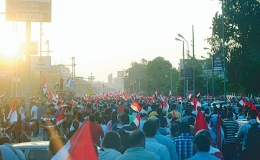Recent events in Egypt since the revolution that overthrew Hosni Mubarak are typical for anyone who follows politics in general. When the revolution against Mubarak started on 25 January 2011, political parties including Islamists, leftists, nationalists and liberals were all united against the president and his security apparatus. Once Mubarak was overthrown and the military took control, cracks in the opposition started to appear. The Islamists refused to take part in the protests against military rule and waited on the election they knew they were going to win, while the rest of the opposition were chanting in the streets.
Recent events in Egypt since the revolution that overthrew Hosni Mubarak are typical for anyone who follows politics in general.

When the revolution against Mubarak started on 25 January 2011, political parties including Islamists, leftists, nationalists and liberals were all united against the president and his security apparatus. Once Mubarak was overthrown and the military took control, cracks in the opposition started to appear. The Islamists refused to take part in the protests against military rule and waited on the election they knew they were going to win, while the rest of the opposition were chanting in the streets.
The Islamists duly won the parliamentary elections that concluded on 11 January 2012. The Freedom and Justice party – the Muslim Brotherhood by another name – came first with more than 37.5 per cent of the vote, followed by the Islamic Bloc (Salafists) with 27.8 per cent, and the liberal New Wafd Party with 9.2 per cent. The Muslim Brotherhood candidate for the presidential election, Mohammed Morsi, narrowly won the election held in June 2012 with an overwhelming 51.73 per cent of the vote.
After the Muslim Brotherhood came to power, it was not easy to work with the military, the security and the judiciary services, which were structured and organised by the old regime to suppress the opposition in general and the Islamists in particular. But it was great to see an Egyptian civilian president elected in a fair and free election for the first time in the country’s history – a very significant move for the whole region, too, as Egypt is the biggest Arab country, and anything that happens in Egypt will impact the rest of the Arab world.
But recent events have shown that friends have switched sides again. Those who once chanted ‘down with the military’ became their allies against the Islamists. Dozens of Muslim Brotherhood offices were torched across Egypt and reports claim many of their supporters have been killed without any intervention by the security forces. Immediately after the military’s decision to depose Morsi on 3 July, some 300 of the Muslim Brotherhood’s leaders were arrested, some local TV stations were shut down and Al Jazeera was not allowed to broadcast from Egypt that night.
From one prospective, many would see this as a military coup and an attack on democracy itself, as the president should have been allowed to serve his full term of 4 years. For another, it’s clear many did not agree with his politics, and they argue the fact that the people came out and demonstrated in the streets was a good enough reason to oust Morsi
I do not have much in common with the Muslim Brotherhood. However, while the ousted president might have been authoritarian in his style, this does not mean that any opposition in the world can come out in the street after losing an election and demand changing the president because they did not agree with his policies.
It is normal for an opposition to deal with such issues in parliament or by street protest, but to change a democratically elected president in such a way is a step back. The last time the result of a democratic election was cancelled in Algeria in the 1990s, hundreds of thousands of people lost their lives in a bloody civil war. Let’s hope that the situation in Egypt will not escalate into anything like that.
For now, the way forward is to have a national unity government in order to save lives and prepare for a new democratic election. For the Arab world to have a proper democracy, leaders have to be changed by the ballot, not the bullet, and the military should stay out of politics.
Mohammed Samaana is a freelance writer based in Belfast.











